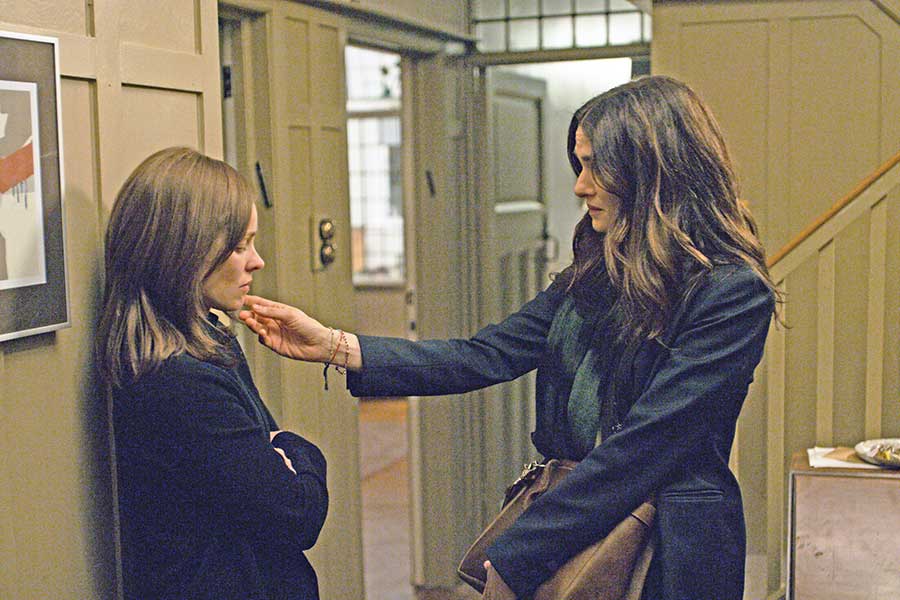Chilean writer/director Sebastián Lelio follows the estimable success of his Oscar-winning trans film “A Fantastic Woman” with the lesbian drama “Disobedience,” a well-intentioned effort opening May 11 at the Landmark Ritz.
Based on Naomi Alderman’s novel, the story has New York-based photographer Ronit Krushka (Rachel Weisz, who coproduced) returning to London following the death of her father, Rav Krushka (Anton Lesser), a beloved rabbi in the city’s Orthodox Jewish community. Ronit has been estranged from her dad because of her sexuality, a fact that comes to light around the film’s midpoint.
While grieving, Ronit is invited to stay with her friend Rabbi Dovid Kuperman (Alessandro Nivola) and his wife, Esti (Rachel McAdams). While Jewish law forbids Ronit from touching Dovid because he is a man, she is very intimate with Esti. As younger women, Ronit and Esti were lovers, and Rav’s discovery of their relationship is what drove — or sent — Ronit away. Now, as Ronit tries to get her father’s affairs in order, she is tempted to rekindle her relationship with Esti.
“Disobedience” provides a didactic lesson in choice and free will. The film opens with Rav Krushka sermonizing about these very topics just before he dies. Ronit obviously chooses to live her life outside the traditions dictated by Jewish law. She offends her Uncle Moshe (out actor Allan Corduner) and others when she declares she doesn’t want to be married or have children.
Meanwhile, Esti is a dutiful wife to Dovid, hoping marriage is a “cure” for her same-sex desires. She has sex with Dovid every Friday in the hopes of producing the expected children.
Almost 45 minutes into the film, Esti and Ronit kiss passionately and express their still-burning attraction for one another. Lelio generates some frisson between the actresses, and a scene of them sharing a cigarette and stealing kisses injects the soporific “Disobedience” with a little excitement.
It is only a matter of time before the lovers’ affair is discovered. Once that happens, they agree that they can’t see each other anymore. So, of course, they sneak off and have hot sex in a hotel room. Arguably, the most erotic moment between them is Ronit taking a post-coital photograph of Esti.
“Disobedience” may include the passion of a hotel-room tryst, but the film is largely without emotion. It is difficult to care about Ronit, the black sheep, even though she looks distraught and bemoans the fact that she did not know her father was ill. She fears her love for her father has gone unacknowledged. Her character seems to be more of a catalyst for awakening Esti’s sublimated desires than the central focus of the film.
One of the more interesting and dramatic scenes has Dovid confronting Esti about her adultery. Their heated and candid exchange gives some depth to their characters, who until that point seemed largely unformed.
Once Esti opens up and talks to Ronit about being deemed “ill in the head” for her lesbianism and admits that she is still attracted to women, that her character takes shape. The toll of adhering to Jewish laws and customs and the struggle she has in living a life over which she has little control are palpable. When Esti tries to convince Ronit she is happy in her life, it is quietly powerful. But a scene of her showering and washing off the sins of her affair while Dovid questions her is heavy-handed.
Dovid is an important character, but he is more symbolic than three-dimensional. That he is Rav Krushka’s “discipline, his spiritual son, and successor,” a substitute for his shunned daughter, feels a bit deliberate and contrived even in the tight-knit Orthodox community.
“Disobedience” favors mood and atmosphere over plot. The film immerses viewers in the lives, homes and rituals of the characters, and Lelio uses space to frame his actors well. It is an interesting, appropriate setting for a film about sexual identity and the perils of conformity. But it never feels subtle or authentic.
The performances by the two Rachels are uneven. Weisz looks suitably wounded throughout the film, especially in the early scenes of her reacting to the news of her father’s death. Her forlorn expressions change only after she reconnects with Esti and experiences a surge of love that has been lacking in her life.
In contrast, McAdams may glow in the presence of Ronit but she is not very convincing as an Orthodox Jew. That said, when she removes her wig — which is customary for Orthodox women to wear — and reveals her “true self,” her transformation is credible.
Nivola (who is Italian but of German-Jewish descent) does his best in his limited role of the cuckold, while Corduner is strong in his few scenes as Ronit’s disapproving uncle.
“Disobedience” is conceived to be full of heartbreak. It is about the lack of love between a father and his daughter and the impossibility of romance between two women who love each other. While Lelio’s film does address these points, it is disappointing that the final product is not more poignant or moving. n

